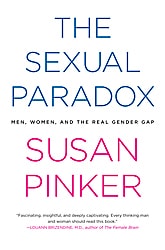Review by Lizzie
In a nutshell: Pinker’s pop science book tackles “the sexual paradox”; that is, why women excel at school, but the pay gender gap persists. Her thesis is that – due to sex based differences in the brain – men tend to be extreme, take risks and focus obsessively on one topic thereby reaping rewards in pay. Whereas, women are well-rounded and relationship oriented, so they prefer flexible hours and personally rewarding occupations even if that means a pay cut.
Interesting tidbit: “The more testosterone a fetus has been exposed to in utero, the less eye contact he makes as a one-year-old, the smaller his vocabulary as a two-year-old, the less he socializes with other children at age four, and the narrower his range of interests.” This explains a lot, yes?
You’ll Like This Book If You Liked: The Tipping Point, Men Are from Mars: Women Are from Venus, The Curious Incident of the Dog in the Night-Time
Why I liked it: Everything suddenly makes sense. Why do I cringe at the thought of investment bankers’ hours? Why did I hate writing my master’s thesis, but loved undergraduate work? Why does my mom ask about my feelings while my dad asks about the weather? It can all be explained by sex based differences in the brain. Phew, I’m not going crazy and becoming an underachiever after all.
Book Club Ideas: Leave work early to meet up with your girlfriends – your hemispherically balanced brain will thank you for it. Sit in a circle and braid each other’s hair (grooming reduces stress in female macaques). Then work on a meaningful hobby, like a letter writing campaign lobbying for better wages for nurses and social workers.
Perfect Present For: Your friend who’s a new teacher and desperate to reach the boys and children with aspergers or ADHD in her class. Your depressed corporate lawyer cousin.
Verdict: Pinker’s book will help you understand yourself and your relationship by giving the evolutionary explanations for the general differences between men and women. Her argument tends to obscure social factors that determine choices i.e. her suggestion that females forced into engineering or computer science in China and the former Soviet Union become manicurists or nannies when they move to Europe and North America because they prefer these jobs blatantly ignores the numerous social issues shaping that choice. Nevertheless, a fascinating read that will make you a better communicator, parent, partner, teacher and co-worker.



 Follow Us On Instagram
Follow Us On Instagram
